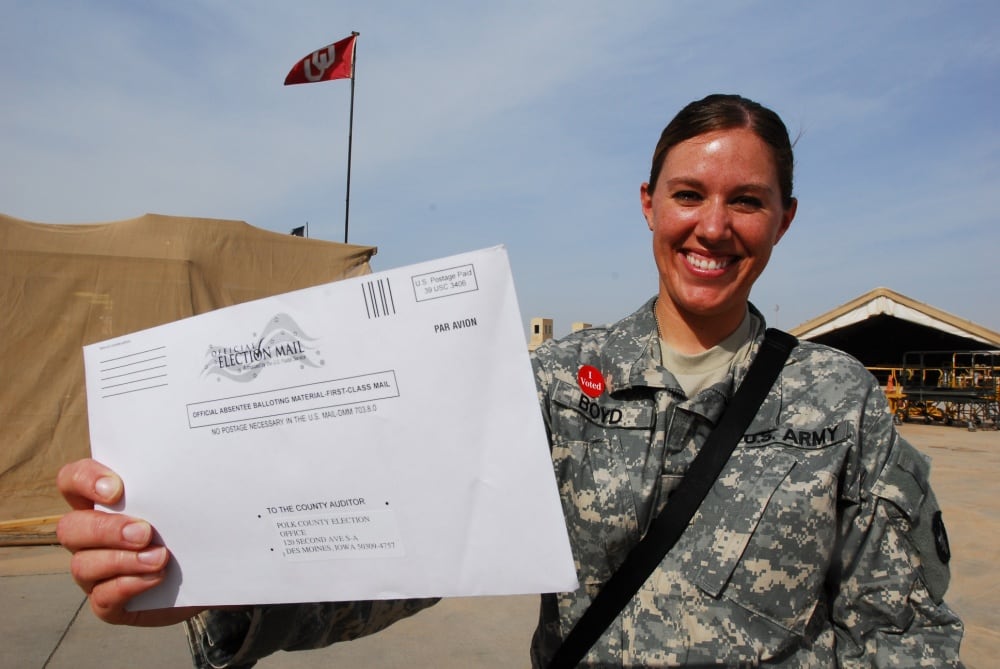Starting today, Georgia county election officials are sending out absentee ballots for the Jan. 5 runoff election for two U.S. Senate seats, to troops, their family members, and overseas U.S. citizens.
The ballots for the runoff election are automatically sent to troops their family members and to overseas U.S. citizens who requested absentee ballots for elections earlier this year. These voters have protections under the Uniformed and Overseas Citizens Absentee Voting Act, which requires election officials to send absentee ballots at least 45 days before elections, among other things. Nov. 21 marks the 45th day before Georgia’s Jan. 5 runoff election. These voters are commonly referred to as UOCAVA voters.
UOCAVA voters include military and family members, both overseas and stateside, who are away from their voting district, as well as U.S. citizens living overseas.
The outcome of this closely watched Georgia Senate runoff election could decide which party has control of the U.S. Senate. Military absentee ballots have been in the spotlight this year.
In this Jan. 5 runoff election, Republican Sen. David Perdue faces Democrat Jon Ossoff in one race. In the other, Republican Sen. Kelly Loeffler faces Democrat Raphael Warnock.
Things to know:
• County election officials will send out absentee ballots Nov. 17 through Nov. 21, said Walter Jones, spokesman for the Georgia Secretary of State’s voter education office.
• Voters will either receive the ballot by mail or electronically, depending on how they chose to receive the ballot when they requested it. According to the latest information available on the Georgia Secretary of State website, 18,008 absentee ballots had been received from UOCAVA voters, and another 8,410 outstanding absentee ballots had been requested, but the voted ballots hadn’t been returned to election officials.
• Are you a legal resident of Georgia and haven’t requested a ballot or registered to vote in Georgia? Not to worry. There’s still time to vote in the Jan. 5 runoff election. You can find Georgia information at the Federal Voting Assistance Program website, which includes information on downloading the Federal Post Card Application, which allows you to register to vote and request your absentee ballot.
• Legal Georgia residents can register to vote in this runoff election through Dec. 7, and can request absentee ballots. Officials will continue to send absentee ballots to these voters, known as UOCAVA voters, as ballot requests are received.
Legal Georgia residents can register to vote by email, fax or mail.
• Once voters receive their absentee ballot, the voted ballot must be mailed back to their county election official. There is no other option for returning the voted ballot. As in the general election, Georgia state law allows three extra days of transit time — through Jan. 8 — for absentee ballots from UOCAVA voters to arrive. Voters who don’t receive their absentee ballot from their election official in time can also download the Federal Write-In Absentee Ballot and mail it to their election official.
• Military and their family members voting from overseas have an extra benefit: access to the free expedited mail service from overseas, and tracking of their absentee ballot. The Military Postal Service Agency has contingencies to extend the use of this program through Jan. 11, for runoff elections for federal offices, according to officials in the Federal Voting Assistance Program office.
Each voted ballot dropped off at a military post office overseas will receive the Label 11-DoD, automatically giving that ballot expedited delivery. Make sure you keep that part of the label with the tracking number that allows you to track your ballot.
This option is available only to service members and their eligible family members who are overseas.
Karen has covered military families, quality of life and consumer issues for Military Times for more than 30 years, and is co-author of a chapter on media coverage of military families in the book "A Battle Plan for Supporting Military Families." She previously worked for newspapers in Guam, Norfolk, Jacksonville, Fla., and Athens, Ga.





